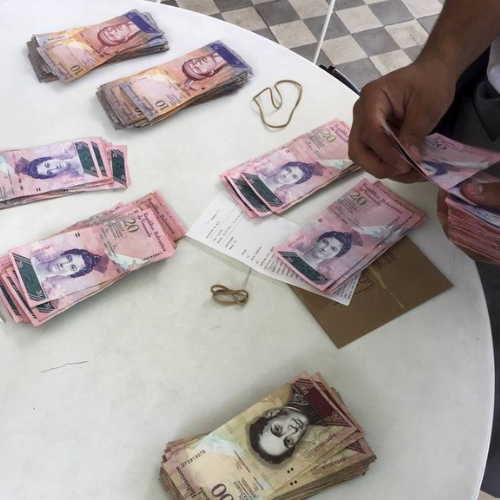Venezuela, a country rich in oil but struggling with deep economic problems, is cracking down on businesses that accept black market dollars. The government wants to protect its official currency, the bolívar, as it comes under pressure from heavy international sanctions.
In recent weeks, the value of the bolívar has dropped sharply when traded outside official channels. This unofficial rate, also known as the parallel exchange rate, rose by 25% in just a few days — from 80 bolívars to 104 per US dollar — before dropping slightly. In contrast, the official government rate only moved a little, from 63 to 70.59 bolívars per dollar.
This big gap between the two rates has created confusion and trouble for businesses. Shops, restaurants, and service providers price their goods in dollars, but most people pay using bolívars. When businesses use the black market rate to calculate prices, they risk getting fined, audited, or even shut down by the government.
Small Businesses Caught in the Middle
Many businesses are finding it nearly impossible to stay afloat. If they follow the official rate, they lose money on every sale. But if they use the black market rate, they face harsh penalties. Some shopkeepers have tried to find a middle ground. They set an “in-between” rate — somewhere between the official and black market rates — hoping to avoid big losses and also avoid government punishment.
Spain Increases Venezuelan Oil Imports as Sanctions Deadline Nears
To do this, some use a mysterious app that helps calculate this middle rate. On one recent day, the app showed a rate between 80 and 90 bolívars per dollar, compared to the official rate of about 70. Businesses say they need this workaround to survive, but they are still afraid. Some say they are just one fine away from losing everything.
The pressure has increased in the past two weeks, with more audits and tougher inspections by government officials. Hair salons, grocery stores, and food stalls are all being watched closely. Even those who try to stay within the rules worry that the constantly changing exchange rates make it too difficult to keep up.
In street markets, signs show the official rate, as required by law. But behind the scenes, vendors whisper the real prices to customers. They avoid writing anything down that could show they used the black market rate. One egg seller said the cost of his stock went up from $61 to $73 in just one day — and in bolívars, that meant a loss because of the unfair exchange rate.
Sanctions Deepen the Economic Strain
The situation is being made worse by new sanctions from the United States. The Venezuelan government has been under sanctions for years, but recently, the pressure increased. The US has canceled special licenses that allowed some big oil companies to do business in Venezuela. These companies now have until May 27 to stop working there.
Eni Faces US Ban on Oil Payments from Venezuela’s PDVSA
The Venezuelan economy depends heavily on oil. When fewer companies can buy or sell oil from Venezuela, the country earns less money. That means fewer dollars coming in, which makes the dollar even more valuable compared to the bolívar. As a result, the black market rate climbs higher.
The US also announced “secondary tariffs” on other countries that buy oil from Venezuela. This adds more pain to Venezuela’s oil industry. Reports say oil exports dropped by over 11% in one month. Though the government denied this, outside data supports the claim.
The bolívar is under more stress than ever. Prices of basic goods are going up quickly. Inflation — the rise in prices — could reach nearly 189% this year, according to local experts. That means something that costs 100 bolívars today could cost almost 200 bolívars by the end of the year.
Over the last few years, the government had relaxed some of its economic rules. People were using US dollars more freely in daily life, a system called “dollarisation.” But now, the tight controls are back, and the freedom to use dollars is being squeezed.
As sanctions bite deeper and the currency gap grows wider, Venezuelan businesses are left in a difficult spot. They are trying to keep their doors open, serve their customers, and obey the law — all while dealing with a money system that feels broken.


